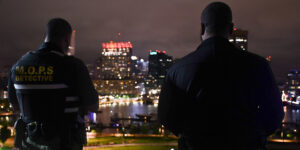More companies in Maryland hiring private security guards to ward off crime
July 4, 2024
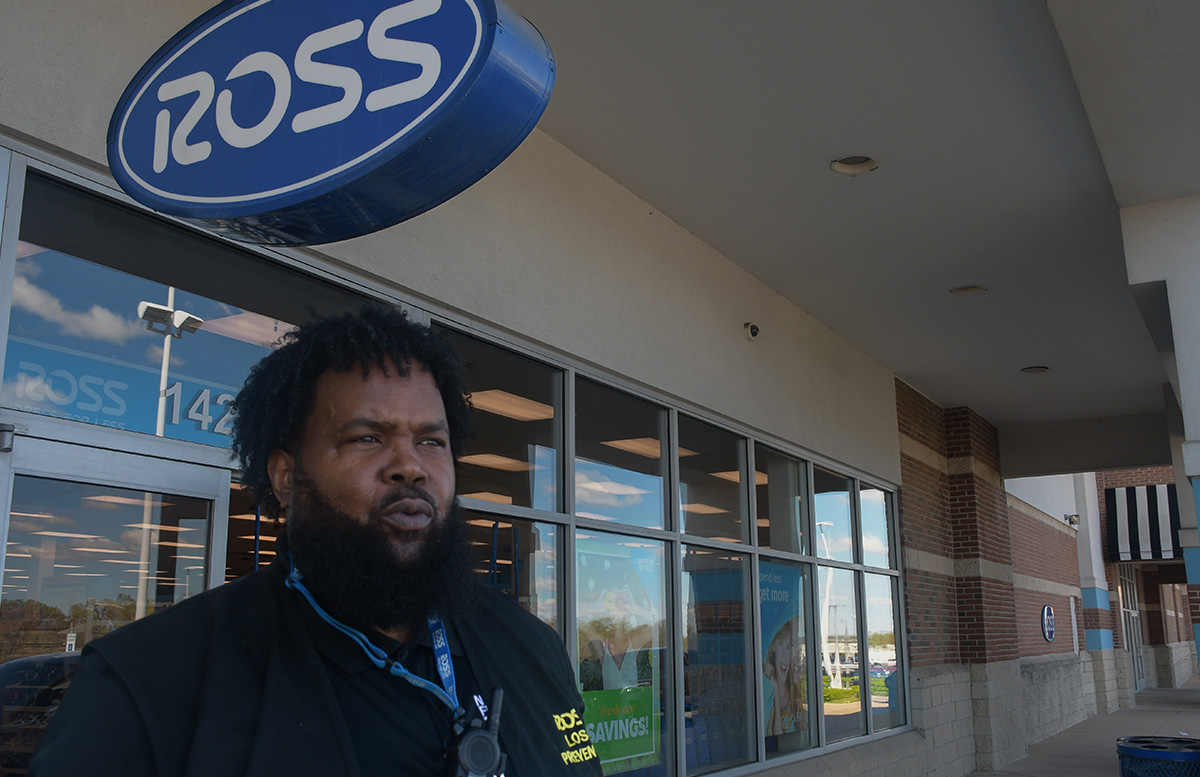
By Alisha Camacho and Rachel McCrea, Capital News Service
As retail and property crime rise and police ranks thin, Maryland neighborhoods, apartment buildings, big box stores, fast-food chains, hospitals, banks and schools rely on more than 26,000 licensed private security guards to deter crime and provide a sense of safety, according to state data and industry specialists.
Retailers are increasingly hiring private guards to thwart organized retail crime, said Cailey Locklair, president of the Maryland Retailers Alliance. The thieves take advantage of Maryland’s port and Interstate 95 to carry merchandise away.
Retailers feel “if the system is going to break down and fail all around me, I have to do something," Locklair said.
The number of licensed private security companies in Maryland saw a 48% jump from 2017 to 2024, according to a Capital News Service analysis of the Maryland State Police licensing division’s public databases. Some 1,060 licensed security agencies operate in Maryland; a number of those also offer investigative services.
Security companies are required to obtain a license to operate.
Guards are required to have a license to work for a security firm but a license is not required to be employed directly by a business such as a convenience store. Unlicensed guards generally work for less pay.
“In Maryland, if an establishment [directly] employs security guards, they are most likely unlicensed and unregulated,” Jill P. Carter, (D-Baltimore), said at a hearing in Annapolis last year.
Many businesses prefer to hire licensed guards, however, because they have passed a background check and been approved by Maryland’s licensing agency.
A new law, which takes effect Jan. 1, requires that all security guards be licensed and go through an initial 12 hours of training approved by the Maryland Police Training and Standards Commission unless an applicant has been employed as a police officer. The training must be paid for by the firm or individual guard. Companies will also be required to carry liability insurance.
The new law will increase oversight of a booming industry that has had little regulation in Maryland.
Lawmakers who debated the passing the law “were shocked to hear that the state had no minimum requirements before putting somebody on a post in a security guard uniform,” said Nick Paros, regional vice president of Allied Universal Security Services, the largest private security company in the world, and a retired Maryland State Police officer, who testified about the legislation.
Currently, a “registered applicant” – a vaguely defined term – for a company must hold its license. There are few requirements to obtain a license, but one is that the applicant must disclose any prior criminal history so the Maryland state licensing agency can decide whether the crimes are disqualifying.
For an individual to obtain a guard license, the applicant needs to be employed by, or a prospective hire of, a licensed firm, “be of good moral character and reputation,” and have not committed a felony or misdemeanor “directly related to the fitness and qualification of the applicant,” according to the Maryland State Police website.
The Maryland State Police considers several factors in deciding if a candidate is of “good moral character and reputation,” said Ron Snyder, a state police spokesman, in an email. That includes the nature of an applicant’s criminal background, such as “felony or misdemeanor, number of arrests, number of convictions as well as the time since the applicant’s last arrest.”
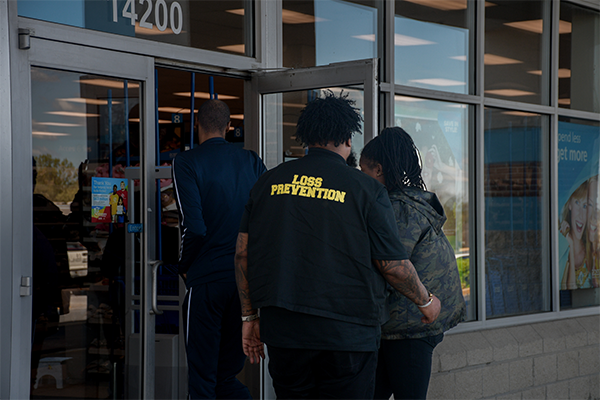
Alex Godfrey assists customers into the Ross Dress for Less discount clothing store at the Laurel Lakes Shopping Centre. (Alisha Camacho/CNS)
Maryland recognizes several categories of security guards, including off-duty police officers, special police officers, armed and unarmed security guards and private detectives.
To be armed requires a state gun permit, the employer’s approval, and approval from the secretary of state police.
In Maryland, unarmed security is more commonplace, but “there’s definitely a growing interest in armed security,” said Steve Amitay, executive director and general counsel of the National Association of Security Companies.
“In the vast majority of cases, you don’t need armed and the clients don’t want armed and the companies don’t want to provide armed,” he said, due to the increased pay required and potential for harm.
Off-duty police officers maintain their police authority as guards. Special police officers are the only other guards who can detain and arrest suspects and only on the property they are hired and approved by the state to protect. SPOs must be at least 18 years old and complete a minimum of 80 hours of training in a state-approved course.
Private guards in Maryland confront many of the same people as police – shoplifters, brawling teens, delusional drug users, the mentally ill in crisis, according to interviews with industry experts, firm owners and guards. Without the authority to arrest people, most guards count on their sheer presence to deter bad behavior and must try to talk people down from psychological or anger-induced rage. When they call police for help, the guards can only hope they come.
“Private security officers are really the first responders,” said Amitay.
New requirements not enough, say critics
People who have been critical of the unregulated nature of the security for years, do not believe Maryland's new law is enough.
“The fact is, some states have no regulations. Some states have poor regulations, and some states have fair regulations. But no state has admirable, replicable regulations,” said Robert McCrie, a professor at the John Jay College of Criminal Justice in New York.
McCrie was disappointed with what he called the new law’s “de minimus” training requirements. He said the best security organizations train monthly or even weekly.
“When you think of the issues that almost any security guard could face, and say, ‘Well … every three years you should have eight hours of training,’ I think that’s really hard to argue,” he said. “It’s so little.”
Rodney Hill, a retired lieutenant deputy district commander in Montgomery County Police Department who teaches law at Stevenson University, agrees the new training requirement is not enough. “... But I love the fact that it’s a great start, he said. “Maybe you start with 12, get to 40, then 80.”
The new law requires training in criminal law, appropriate use of force, use of alternatives to force, de-escalation techniques, interacting with minors, dealing with behavioral health and other disabilities, and individuals in crisis. An additional eight hours of education is required every three years for recertification.
“The majority of our issues are just dealing with irate customers,” said Ronald “Trey” Cole, a regional manager at Trust Consulting Services, a company that supplies 60 to 80 guards to Maryland agencies including the Department of Social Services and district courts.
The frequency of mass shooter events has prompted churches and even libraries to inquire about guards, he said.
For 20 years, Maryland state agencies have employed private security. The current contracts total $43 million, mostly to provide 140 security guards at 10 different agencies, said Nick Cavey, a spokesperson for the Maryland Department of General Services.
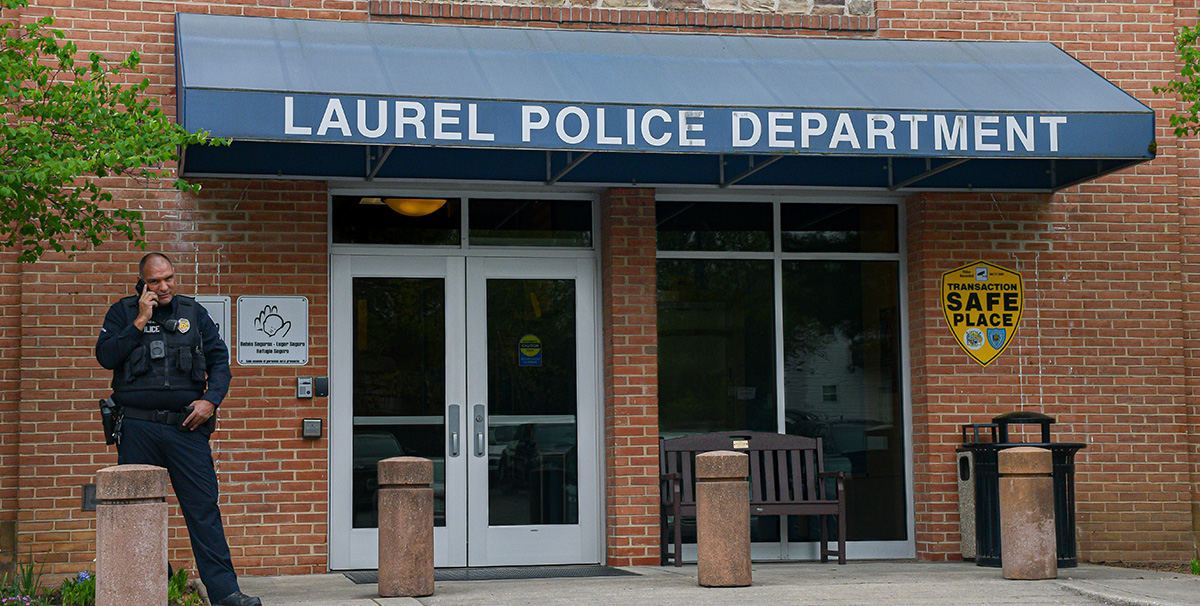
Officer Edwin Monarrez with the Laurel Police Department helps patrol the Laurel Lakes Shopping Centre, waiting for calls from security guards. (Alisha Camacho/CNS)
Working with the police
For eight years, Alex Godfrey, 43, has worked part time as a security guard at the Ross Dress for Less discount clothing store at the Laurel Lakes Shopping Centre to supplement his full-time financial services job. “I’m a banker by day, crime fighter by night,” Godfrey said, chuckling on the phone.
He believes he provides a sense of safety to shoppers but is frustrated by a wave of shoplifting since the COVID lockdown, he said. Godfrey is not allowed to detain shoplifters because he is not a law enforcement officer. The thieves, Godfrey believes, know this too. “They go into Ross and grab everything and walk out knowing that you cannot touch them or apprehend them,” he said.
Godfrey can’t arrest shoplifters, but he knows the people who can.
Laurel police officers patrol the area and the shopping center hires off-duty police to sit in the parking lot a few days a week, waiting for calls from security guards inside.
A few months ago, at about 8:45 p.m., a couple who appeared to be under the influence came into the store, Godfrey said. The man began throwing towels and random items into his cart, he said, while the woman stuffed items into her purse.
Godfrey called the non-emergency police number and a Laurel police officer stationed outside entered the store. The man left his cart of mounting items behind. The woman tried to check out, but her card did not work. They both left and jumped into a car waiting for them in the parking lot, and drove off.
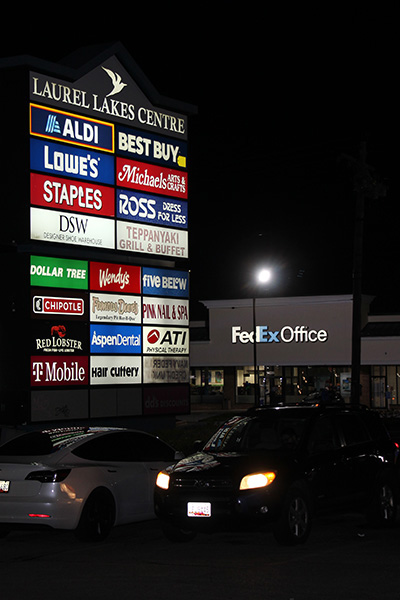

Caprice Smith, a retired police officer and criminal justice lecturer at Stevenson University, worries that private security will create affluent bubbles of safety, like universities and their immediate areas. “You can’t have such separate societies,” Smith said. “It has to be integrated and inclusive.”
Universities and their immediate areas have less crime, she said, but often do not reflect the community at large. “You can’t have such separate societies. It has to be integrated and inclusive.”
The proponents of the private security industry, meanwhile, appreciate that Maryland is taking the industry more seriously, said Paros, of Allied. “We are now at the point where the state is recognizing that security isn’t in the same category as lawn maintenance and housekeeping.”


